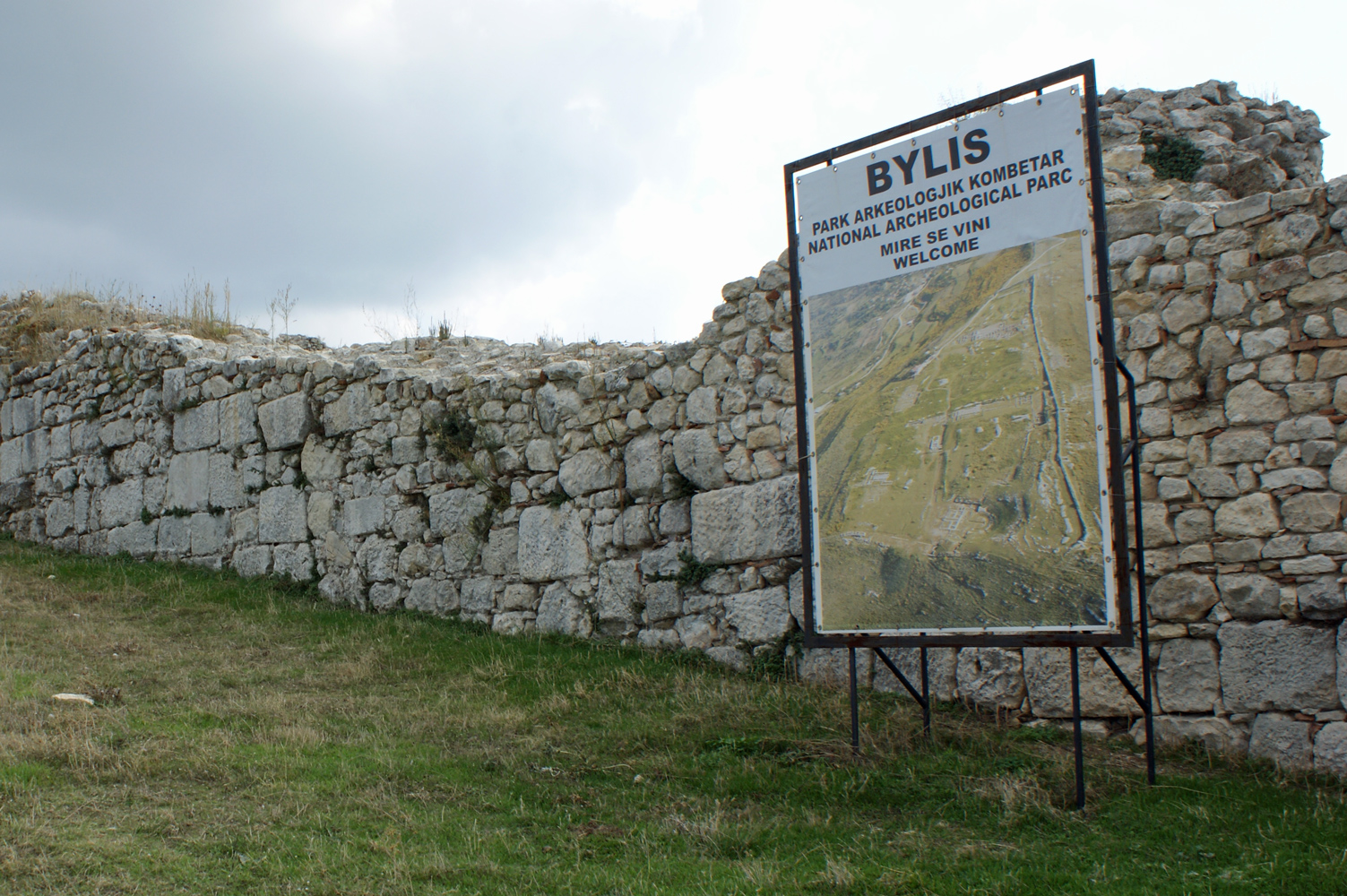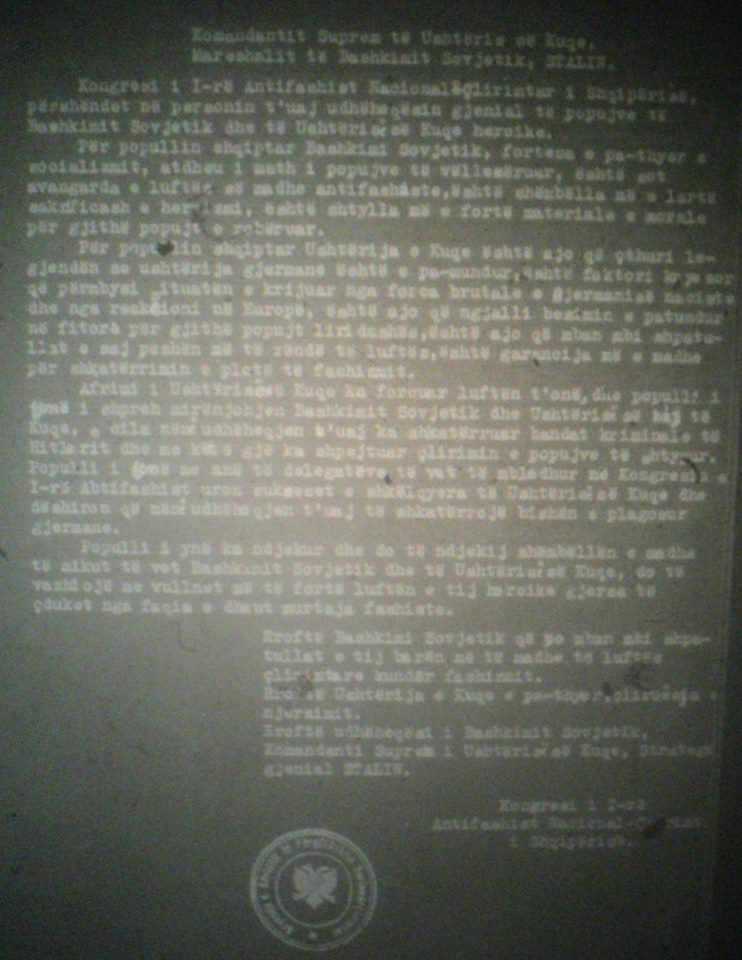|
Omer Nishani
Omer Nishani (5 February 1887 – 26 May 1954) was an Albanian medical doctor and political figure involved first in the struggle against Ahmet Zogu (known after 1928 as King Zog) in the 1920s and 1930s, and then in the struggle against the fascist occupation of Albania during the 1942–44 period, becoming Chairman of the Presidium of the People's Assembly of the People's Republic of Albania (thereby becoming the country's head of state) in 1946 and serving in this position until 1953. Biography Omer was born in Gjirokastër in the Janina Vilayet of the Ottoman Empire. His brother, Beso, was a teacher whose students included a young Enver Hoxha (also a native of Gjirokastër). Nishani studied medicine in Istanbul, graduating but not practicing it as a profession. He worked as a physician in Vienna and from 1915 to 1918, worked in Ballsh. He moved to Tirana in the Tirana Hospital and then in Durrës until 1924. In the early 1920s he involved himself in politics. He participated i ... [...More Info...] [...Related Items...] OR: [Wikipedia] [Google] [Baidu] |
Minister Of Foreign Affairs (Albania)
The Ministry for Europe and Foreign Affairs ( sq, Ministria për Europën dhe Punët e Jashtme) is a department of the Albanian Government, in charge of diplomacy, foreign policy and the process of admission of Albania into the European Union. The ministry also provides support to Albanian citizens residing abroad. In September 2017, the ministry was restructured and it was merged with the Ministry of European Integration. History Establishment The establishment of the Ministry of Foreign Affairs (MFA) of the modern Albanian state dates back to the creation of the Provisional Government of Vlora on December 4, 1912, a few days after declaring Albania's secession from the Ottoman Empire. The Prime Minister of the Provisional Government, Ismail Qemali, also held the post of Minister of Foreign Affairs until June 1913. Later this function passed to Myfit Bey Libohova who exercised it until the end of January 1914. The MFA in this period functioned as a section of the Provisional G ... [...More Info...] [...Related Items...] OR: [Wikipedia] [Google] [Baidu] |
Ballsh
Ballsh ( sq-definite, Ballshi) is a town and a former municipality in Fier County, southern Albania. At the 2015 local government reform it became a subdivision and the seat of the municipality Mallakastër. It was the seat of the former District of Mallakastër. The population at the 2011 census was 7,657.2011 census results Name It was centre of Malkasra (Turkish of "") kaza in in Yanya Vilayet during Ottoman rule between 1670 and 1912. ...[...More Info...] [...Related Items...] OR: [Wikipedia] [Google] [Baidu] |
Congress Of Përmet
The Congress of Përmet, was a meeting of the Albanian communist leaders on May 24, 1944, in Përmet, Albania, which elected a Provisional Government. The congress was modeled after the Anti-Fascist Council for the National Liberation of Yugoslavia The Anti-Fascist Council for the National Liberation of Yugoslavia,, mk, Антифашистичко собрание за народно ослободување на Југославија commonly abbreviated as the AVNOJ, was a deliberat .... 188 delegates attended the Congress. The majority of the delegates came from Southern and Central Albania: 25 from Korça, 48 from Vlora-Gjirokastra, 15 from Berat, 8 from Elbasan, 10 from Tirana, 3 from Peza, 2 from Durrës. Additionally, the congress was attended by delegates of the National Liberation Movement and the Brigades. Politico-military conditions for calling the Congress of Përmet The National Liberation Movement (LANÇ) and the Albanian National Liberation Army (UNÇSH) ... [...More Info...] [...Related Items...] OR: [Wikipedia] [Google] [Baidu] |
National Liberation Movement (Albania)
The National Liberation Movement ( sq, Lëvizja Nacional-Çlirimtare; or ''Lëvizja Antifashiste Nacional-Çlirimtare'' (LANÇ)), also translated as National Liberation Front, was an Albanian communist resistance organization that fought in World War II. It was created on 16 September 1942, in a conference held in Pezë, a village near Tirana, and was led by Enver Hoxha. Apart from the figures which had the majority in the General Council it also included known nationalists like Myslim Peza. In May 1944, the Albanian National Liberation Front was transformed into the government of Albania and its leaders became government members, and in August 1945, it was replaced by the Democratic Front. The Albanian National Liberation Army (''Ushtria Nacional-Çlirimtare'') was the army created by the National Liberation Movement. Background Italian invasion Albania did not put an organized resistance to the Italian invasion (April 7–12, 1939). However different Albanian groups of patri ... [...More Info...] [...Related Items...] OR: [Wikipedia] [Google] [Baidu] |
Quisling
''Quisling'' (, ) is a term used in Scandinavian languages and in English meaning a citizen or politician of an occupied country who collaborates with an enemy occupying force – or more generally as a synonym for ''traitor''. The word originates from the surname of the Norwegian war-time leader Vidkun Quisling, who headed a domestic Nazi collaborationist regime during World War II. Origin Use of Vidkun Quisling's surname as a term predates World War II. The first recorded use of the term was by Norwegian Labour Party politician Oscar Torp in a 2 January 1933 newspaper interview, where he used it as a general term for Quisling's followers. Quisling was at this point in the process of establishing the Nasjonal Samling (National Unity) party, a fascist party modelled on the German Nazi Party. Further uses of the term were made by Aksel Sandemose, in a newspaper article in ''Dagbladet'' in 1934, and by the newspaper '' Vestfold Arbeiderblad'', in 1936. The term with the oppos ... [...More Info...] [...Related Items...] OR: [Wikipedia] [Google] [Baidu] |
Party Of Labour Of Albania
The Party of Labour of Albania ( sq, Partia e Punës e Shqipërisë, PPSh), sometimes referred to as the Albanian Workers' Party (AWP), was the ruling and sole legal party of Albania during the communist period (1945–1991). It was founded on 8 November 1941 as the Communist Party of Albania (, PKSh) but changed its name in 1948. The party was dissolved on 13 June 1991 and succeeded by the Socialist Party of Albania. For most of its existence, the party was dominated by its First Secretary, Enver Hoxha, who was also the ''de facto'' leader of Albania. Background In the 1920s, Albania was the only Balkan country without a communist party. The first Albanian communists emerged from the followers of Albanian clergyman and politician Fan S. Noli. Once in Moscow, they formed the National Revolutionary Committee and became affiliated to the Comintern. In August 1928, the first Albanian Communist Party was formed in the Soviet Union. The most prominent figure of the party was Ali K ... [...More Info...] [...Related Items...] OR: [Wikipedia] [Google] [Baidu] |
Albanian Kingdom (1939–1943)
Kingdom of Albania may refer to: *Kingdom of Albania (medieval) — from the Capetian House of Anjou *Albanian Kingdom (1928–1939) — from the House of Zogu *Albanian Kingdom (1939–1943) — from the House of Savoy during the Italian occupation *Albanian Kingdom (1943–1944) — during the German occupation See also *Principality of Arbanon *Principality of Albania (medieval) — from the House of Thopia and the House of Balsha *Principality of Albania — from the House of Wied {{disambiguation ... [...More Info...] [...Related Items...] OR: [Wikipedia] [Google] [Baidu] |
Italian Invasion Of Albania
The Italian invasion of Albania (April 7–12, 1939) was a brief military campaign which was launched by the Kingdom of Italy against the Albanian Kingdom in 1939. The conflict was a result of the imperialistic policies of the Italian prime minister and dictator Benito Mussolini. Albania was rapidly overrun, its ruler King Zog I was forced to go into exile in neighboring Greece, and the country was made a part of the Italian Empire as a protectorate in personal union with the Italian Crown. Background Albania had long been of considerable strategic importance to the Kingdom of Italy. Italian naval strategists coveted the port of Vlorë and the island of Sazan which is located at the entrance to the Bay of Vlorë, because they wanted to use it as an entrance to the Adriatic Sea, and they also wanted to construct a suitable base on Vlorë and Sazan and use it to conduct military operations in the Balkans. In the late Ottoman period, with a local weakening of Islam, the Albani ... [...More Info...] [...Related Items...] OR: [Wikipedia] [Google] [Baidu] |
Geneva
Geneva ( ; french: Genève ) frp, Genèva ; german: link=no, Genf ; it, Ginevra ; rm, Genevra is the List of cities in Switzerland, second-most populous city in Switzerland (after Zürich) and the most populous city of Romandy, the French-speaking part of Switzerland. Situated in the south west of the country, where the Rhône exits Lake Geneva, it is the capital of the Canton of Geneva, Republic and Canton of Geneva. The city of Geneva () had a population 201,818 in 2019 (Jan. estimate) within its small municipal territory of , but the Canton of Geneva (the city and its closest Swiss suburbs and exurbs) had a population of 499,480 (Jan. 2019 estimate) over , and together with the suburbs and exurbs located in the canton of Vaud and in the French Departments of France, departments of Ain and Haute-Savoie the cross-border Geneva metropolitan area as officially defined by Eurostat, which extends over ,As of 2020, the Eurostat-defined Functional Urban Area of Geneva was made up of 9 ... [...More Info...] [...Related Items...] OR: [Wikipedia] [Google] [Baidu] |
KONARE
Konare may refer to: People * Alpha Oumar Konaré * Issa Konare * Adame Ba Konaré * Amadou Konare * Soumaïla Konaré Organizations * KONARE, left-wing revolutionary organization of Albanian émigré Places * Konare, Dobrich Province Konare is a village in General Toshevo Municipality, Dobrich Province, in northeastern Bulgaria Bulgaria (; bg, България, Bǎlgariya), officially the Republic of Bulgaria,, ) is a country in Southeast Europe. It is situated on ... * Konare, Stara Zagora Province {{disamb ... [...More Info...] [...Related Items...] OR: [Wikipedia] [Google] [Baidu] |
Comintern
The Communist International (Comintern), also known as the Third International, was a Soviet Union, Soviet-controlled international organization founded in 1919 that advocated world communism. The Comintern resolved at its Second Congress to "struggle by all available means, including armed force, for the overthrow of the international bourgeoisie and the creation of an international Soviet republic (system of government), Soviet republic as a transition stage to the complete abolition of the state". The Comintern was preceded by the 1916 dissolution of the Second International. The Comintern held seven World Congresses in Moscow between 1919 and 1935. During that period, it also conducted thirteen Enlarged Plenums of its governing Executive Committee of the Communist International, Executive Committee, which had much the same function as the somewhat larger and more grandiose Congresses. Joseph Stalin, leader of the Soviet Union, dissolved the Comintern in 1943 to avoid antag ... [...More Info...] [...Related Items...] OR: [Wikipedia] [Google] [Baidu] |
Trial In Absentia
Trial in absentia is a criminal proceeding in a court of law in which the person who is subject to it is not physically present at those proceedings. is Latin for "in (the) absence". Its meaning varies by jurisdiction and legal system. In common law legal systems, the phrase is more than a spatial description. In these systems, it suggests a recognition of a violation to a defendant's right to be present in court proceedings in a criminal trial. Conviction in a trial in which a defendant is not present to answer the charges is held to be a violation of natural justice. Specifically, it violates the second principle of natural justice, (hear the other party). In some civil law legal systems, such as that of Italy, is a recognized and accepted defensive strategy. Such trials may require the presence of the defendant's lawyer, depending on the country. Europe Member states of the Council of Europe that are party to the European Convention on Human Rights are bound to adher ... [...More Info...] [...Related Items...] OR: [Wikipedia] [Google] [Baidu] |





